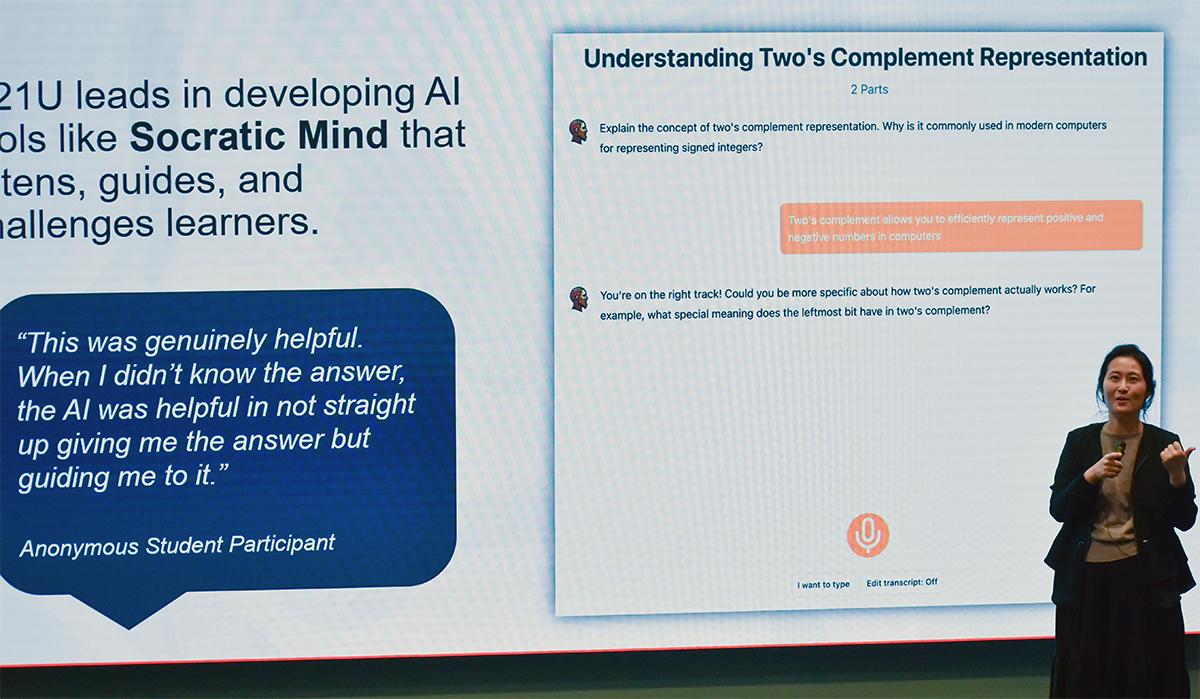Center for 21st Century Universities (C21U) Director of Research in Education Innovation Jonna Lee recently delivered an insightful presentation at the Inventing the Future of Learning symposium titled "C21U Roadmap for the Future of Education: AI, Innovation, and the Next Frontier. " In it, she explored the transformative impact of technology and automation on education and the research C21U is leading to help it evolve.
Lee highlighted several key challenges facing education today. She explained that traditional education systems are linear, but careers are not, requiring flexible and accessible pathways for reskilling and upskilling. Lee also highlighted that despite the abundance of learning data, there is a lack of straightforward insights into what improves student learning. Besides, skills like critical thinking, problem-solving, communication, and leadership are in high demand but difficult to teach and measure.

As AI becomes more integrated into society, learners must learn to use AI effectively and ethically. Lee emphasized, "Teaching AI literacy is no longer optional. It is foundational." She also identified several opportunities for innovation in education: the rise of online certificate degrees, stackable credentials, and hybrid learning models presents new learning pathways; and grounding data science analytics in learning science principles can better serve students.
She showcased innovative research approaches at C21U, including technology-based, data-driven, human-centered, interdisciplinary, and continuous innovation strategies. One notable example is the prototype AI-based web dashboard called LOR Insight (LORI), designed to help admission officers assess and summarize the leadership attributes of program applicants using advanced natural language processing models.
Lee's presentation underscored the importance of adapting education to meet the needs of modern learners. She emphasized the necessity of flexible learning pathways, such as modular stackable programs, to support lifetime learning. "Education is no longer a 'one size fits all' or a 'one-time only.' It must adapt to support learners at every stage of life," Lee reiterated, emphasizing the shift towards modular learning journeys. C21U's research uses learning analytics and machine learning techniques to analyze these environments and understand how students engage and progress.
Moreover, Lee emphasized the significance of measuring durable skills beyond traditional grade systems. C21U's research aims to draw data-driven insights from various sources, including letters of recommendation and online discussion forums, to understand students' competencies and skills better.
In collaboration with the College of Computing, C21U has developed human-centered AI tools like Socratic Mind, an AI-based oral assessment tool that challenges students to explain and justify their understanding. This tool has received positive feedback from students and teachers, demonstrating its efficacy in enhancing critical thinking skills. One student remarked, "This was genuinely helpful. When I didn't know the answer, the AI guided me to it rather than just giving it to me."
Lee concluded her talk by emphasizing the importance of interdisciplinary research and collaboration. She shared examples of how C21U is leveraging emerging technologies like extended reality (XR) to transform learning spaces and improve student engagement. "Transformation is impossible in isolation. We must focus on collaboration and partnership," Lee noted, stressing the importance of interdisciplinary efforts.
Jonna Lee's presentation provided a comprehensive overview of the challenges and opportunities in the future of education. Her insights and innovative approaches at C21U pave the way for a more flexible, data-driven, and human-centered education system that can better prepare learners for the complexities of the modern world.
(text and background only visible when logged in)